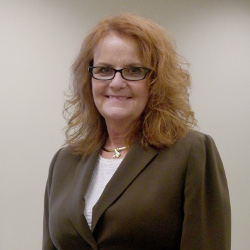BY AJ TRAGER
 Dr. Beverly Mihalko, assistant professor of Health Sciences at EMU, discussed her recent study on long term care of LGBT older adults in the state in a Equality Knowledge Project presentation held Dec. 8, 2015
Dr. Beverly Mihalko, assistant professor of Health Sciences at EMU, discussed her recent study on long term care of LGBT older adults in the state in a Equality Knowledge Project presentation held Dec. 8, 2015 YPSILANTI – An Eastern Michigan University professor conducted a study of Michigan's long term care (LTC) facilities and found that despite the existence of models, the state's LTCs have no plan on how to approach the care of LGBT older adults.
In a presentation for the EMU Equality Research Center's Equality Knowledge Project held late last year, Dr. Beverly Mihalko, assistant professor of Health Sciences at EMU, discussed her recent study on long term care of LGBT older adults in the state.
Mihalko sent a survey to 440 of the 450 heads of Michigan LTC administrators regarding their LGBT inclusion policies and practices. Of the 440, she received 109 surveys back. Her results represent 46 of Michigan's 83 counties.
"There is a considerable lack of awareness and sensitivity – at least as it was reported by the directors of nursing homes and long-term care facilities, to the health and psychological needs of LGBT older adults," Mihalko said.
Today's LGBT older adults were born between 1915 and 1950 and have seen the community grow and expand from the days of total harassment and bigotry to a time when LGBT couples can get married. Today's LGBT older adults remember when they feared institutionalization for voicing their love for someone of the same-sex and they remember when homosexuality was removed from the DSM (Diagnostic and Statistical Manual of Mental Disorders) in 1972.
However, these individuals are among the community's most invisible, often feeling rejected by the younger LGBT community. Simultaneously, they also report feeling rejected by the aging facilities that are supposed to treat them. So, after facing a lifetime of stigma paired with noninclusive practices by facilities and administrative staff, many LGBT older adults fall back into the closet and become further isolated in many long term care facility environments.
Lost In Translation
LGBT older adults are disproportionately affected by physical and mental health issues and are more likely to live alone than their heterosexual counterparts. A 1987 bill called the "Nursing Home Reform Act" established a quality of patient care for the aging, but the qualifications do not translate over to the care of LGBT older adults.
The survey Mihalko sent out included questions regarding admission processes, inclusive policies and environments, existence of competency and awareness training programs for staff and whether the facility addresses needs of LGBT residents in their current administrative policies and practices. Participants were given the opportunity to explain their answer in a short open ended response format.
According to the study, 55 percent of Michigan LTCs have had an openly LGB resident at the facility and only 17 percent have had an openly trans resident. Less than 20 percent reported that they currently house an LGB resident and only 5 percent reported currently housing a trans resident.
Even though 87 percent of respondents self-reported that they offer a welcoming, safe environment for LGB residents and 79 percent reported offering a safe environment for trans residents, almost 15 percent stated that they were uncertain if they provide a safe environment for LGBT residents. The reasons, they wrote in short answer, are a result of not currently housing openly LGBT residents, confidence that they treat all residents with dignity and respect and that "equal treatment" is enough to ensure comprehensive care.
"A significant number of people, very surprising to me, answered anywhere from 10-30 open-ended responses for those questions. People were interested in sharing. A lot of it seemed very defensive. Others, although a smaller number of them, did indicate that these are things that they have discussed and that they need to begin that dialogue. The clear theme to me was, quite honestly, they don't get it. And a more professional way of saying that is, 'We treat everyone the same,'" Mihalko explained.
Mihalko's results indicate that even though a majority of Michigan LTCs ask about a patient's relationship status when they enter into a facility, LTCs rarely use inclusive terms such as partner or domestic partner. According to Mihalko's results, less than 15 percent of Michigan LTCs host LGBT events and programs and just over 10 percent provide trans specific programming.
However, 84 percent of LTCs in the state are actively working to manage discriminatory language or behaviors directed towards LGBT residents and 81 percent reported using the resident's preferred name and pronoun.
"There is a general lack of inquiry on sexual orientation and gender identity and staff awareness training which perpetuates the invisibility of LGBT older adults in long-term care and in health care in general," Mihalko said.
Suggestions
To fix these problems, Mihalko suggests that LTCs advance the conversation and include awareness training for all levels of long-term care, especially on the corporate level for all health professionals. Mihalko suggests that LGBT cultural competency and awareness training is crucial not just for those providing direct patient care but for all health care workers providing care to older adults.
Mihalko believes additional research is needed on LGBT aging and health services to identify more best practices so that the community can see how implementing those services can impact resident care and equity.
"What if I have PTSD from a brutal rape and that's one of the reasons I am in long-term care. Or several bones are broken or something? We don't treat everyone the same in healthcare. We don't treat men and women the same nor do we treat adults and children the same. They have special care needs and issues. That's what patient-centered individualized care is all about and obviously that has not entered into the nursing home philosophy yet. So we have a long way to go," Mihalko said.
Mihalko received five unsolicited emails from administrative officials who had completed the survey, found it enlightening and wanted to share that they will be working to update administrative policies to be more inclusive to current and prospective LGBT residents.
Mihalko tried to get an endorsement from Leading AGE, the professional organization for long-term care directors, but eventually let go of the possible endorsement after being given the runaround by the organization.
The study supports findings from SAGE, advocacy groups and articles published in academic journals.











